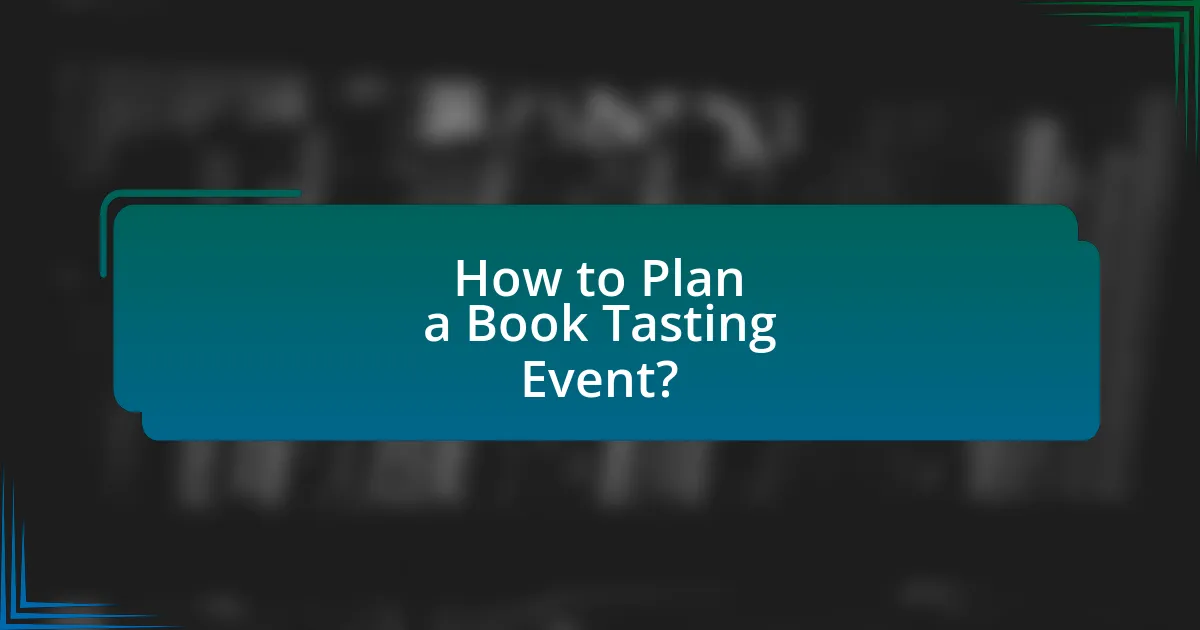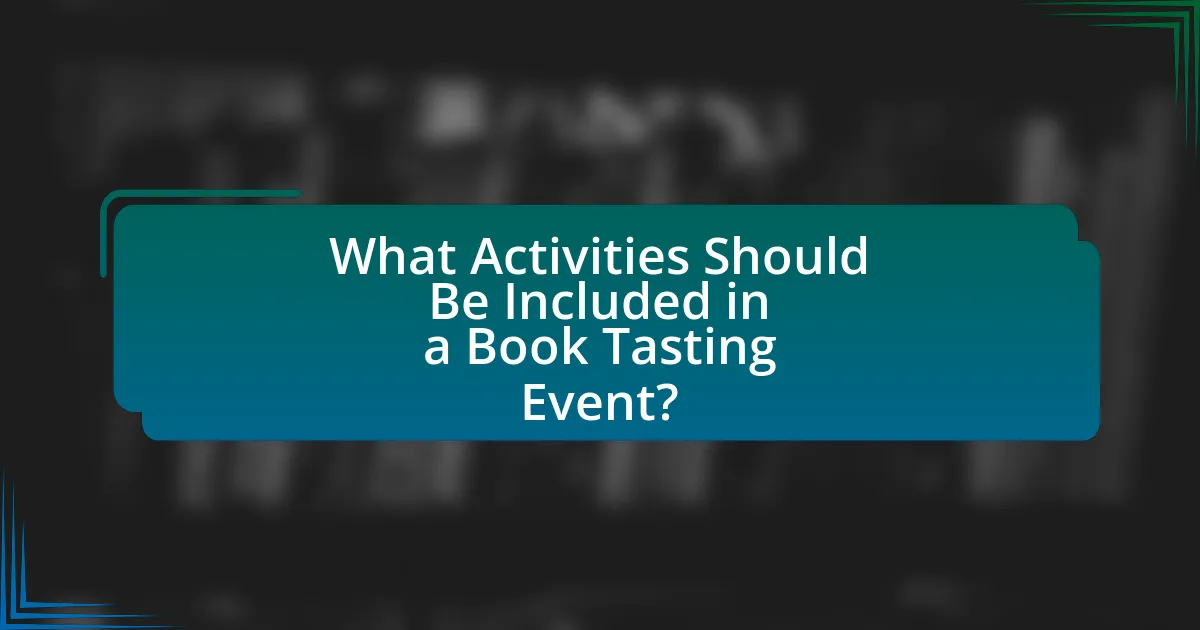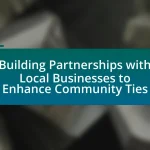A Book Tasting Event is an interactive gathering designed to allow participants to sample a variety of books across different genres in a short time frame, fostering engagement and discussion. This format differs from traditional book clubs by encouraging exploration without the commitment of reading entire books. The article outlines the unique elements involved in hosting a Book Tasting Event, including curated book selections, themed settings, and interactive discussions, while also providing guidance on planning, promoting, and executing a successful event. Key strategies for maintaining participant engagement, handling differing opinions, and utilizing feedback for future improvements are also discussed, making it a comprehensive resource for anyone interested in organizing such an event.

What is a Book Tasting Event?
A Book Tasting Event is an interactive gathering where participants sample a variety of books in a short amount of time, similar to a food tasting. During this event, attendees explore different genres and titles, often in a relaxed setting, allowing them to discover new reading materials and share their impressions. This format encourages engagement and discussion about the books, fostering a community of readers. Book Tasting Events are often used in educational settings to promote literacy and encourage students to explore diverse literature.
How does a Book Tasting Event differ from a traditional book club?
A Book Tasting Event differs from a traditional book club primarily in its format and purpose. While a traditional book club typically focuses on in-depth discussions of a single book over a set period, a Book Tasting Event allows participants to sample multiple books in a shorter time frame, often featuring a curated selection of titles. This format encourages exploration and discovery, as attendees can engage with various genres and authors without the commitment of reading an entire book. The interactive nature of a Book Tasting, often accompanied by themed snacks or activities, enhances the experience, making it more of a social event compared to the more discussion-focused traditional book club.
What unique elements are involved in a Book Tasting Event?
A Book Tasting Event involves unique elements such as curated book selections, themed table settings, timed reading sessions, and interactive discussions. Curated book selections allow participants to explore a variety of genres and titles, enhancing their reading experience. Themed table settings create an inviting atmosphere that reflects the chosen books, engaging attendees visually. Timed reading sessions, typically lasting a few minutes per book, encourage participants to sample multiple titles in a short period, fostering excitement and discovery. Interactive discussions facilitate sharing of impressions and recommendations, enriching the overall experience and promoting community engagement. These elements collectively create an immersive and enjoyable environment for exploring literature.
Why is the concept of ‘tasting’ applied to books?
The concept of ‘tasting’ is applied to books to create an engaging experience that allows readers to sample various genres and styles before committing to a full read. This approach mirrors culinary tastings, where small portions are offered to help individuals discover new flavors, thereby encouraging exploration and enjoyment of literature. By presenting excerpts or summaries, book tastings facilitate informed choices and foster a deeper appreciation for diverse narratives and authors.
What are the goals of hosting a Book Tasting Event?
The primary goal of hosting a Book Tasting Event is to engage participants in exploring a variety of curated book selections in an interactive and enjoyable manner. This event aims to foster a love for reading by allowing attendees to sample different genres and authors, thereby encouraging them to discover new books they may want to read in full. Additionally, it serves to create a community atmosphere where discussions about literature can thrive, enhancing social connections among participants. Research indicates that interactive reading events can significantly increase participants’ interest in reading, as evidenced by a study published in the Journal of Educational Psychology, which found that engagement in such activities leads to higher rates of book borrowing and reading frequency.
How can a Book Tasting Event promote reading among participants?
A Book Tasting Event promotes reading among participants by providing an interactive and engaging environment that encourages exploration of diverse genres and titles. This format allows attendees to sample various books in a short time, fostering curiosity and interest in reading. Research indicates that exposure to a variety of literature can enhance reading motivation and preferences, as participants discover new authors and themes they may not have considered before. Additionally, the social aspect of discussing books with peers can create a community of readers, further motivating individuals to read more.
What role does curation play in achieving the event’s goals?
Curation plays a critical role in achieving the goals of a book tasting event by ensuring that the selected books align with the interests and preferences of the audience. By carefully choosing a diverse range of titles, the event can engage participants, foster meaningful discussions, and enhance the overall experience. For instance, research indicates that well-curated selections can increase participant satisfaction and retention, as attendees are more likely to connect with materials that resonate with their tastes. This strategic selection process not only highlights the value of the books but also promotes a deeper appreciation for literature, ultimately fulfilling the event’s objectives.

How to Plan a Book Tasting Event?
To plan a book tasting event, first select a theme or genre that will guide the book selections, ensuring they are diverse and engaging for participants. Next, curate a list of books that fit the theme, ideally including a mix of popular titles and lesser-known works to spark interest. Set a date and location for the event, ensuring it is accessible and comfortable for attendees. Prepare tasting stations where participants can sample excerpts from each book, allowing them to experience different writing styles and genres. Additionally, provide discussion prompts or questions to facilitate conversation among attendees about their impressions of the selections. Finally, promote the event through social media, local libraries, or community centers to attract a diverse audience.
What steps are involved in organizing a successful Book Tasting Event?
To organize a successful Book Tasting Event, follow these steps: first, select a theme or genre that aligns with the interests of your audience, ensuring it is engaging and relevant. Next, curate a diverse selection of books that fit the theme, providing a variety of genres, authors, and formats to cater to different tastes. After that, create an inviting atmosphere by arranging comfortable seating, appropriate lighting, and themed decorations to enhance the experience.
Then, promote the event through social media, local libraries, and community boards to attract participants, ensuring to highlight the unique aspects of the event. On the day of the event, set up stations for each book, allowing attendees to sample different titles for a limited time, and encourage discussions among participants to foster engagement. Finally, gather feedback from attendees to assess the event’s success and identify areas for improvement for future events.
How do you select the right venue for the event?
To select the right venue for a book tasting event, assess the space’s capacity, accessibility, and ambiance to ensure it aligns with the event’s theme and audience size. A venue should comfortably accommodate the expected number of attendees while providing a welcoming atmosphere that enhances the experience of showcasing curated book selections. For instance, a library or a cozy café can create an intimate setting conducive to discussions about books, while a larger community center may be suitable for a more extensive gathering. Additionally, consider logistical factors such as parking availability and public transport access to facilitate attendance.
What factors should be considered when choosing books for tasting?
When choosing books for tasting, consider the target audience’s interests, the diversity of genres, and the thematic relevance to the event. Understanding the audience ensures that the selections resonate with their preferences, while a variety of genres keeps the tasting engaging and inclusive. Thematic relevance ties the books to the event’s purpose, enhancing the overall experience. For instance, if the event focuses on summer reads, selecting light-hearted fiction and travel narratives would be appropriate.
How can you create an inviting atmosphere for the event?
To create an inviting atmosphere for the event, focus on warm lighting, comfortable seating, and engaging decor. Warm lighting, such as soft lamps or string lights, fosters a cozy environment, while comfortable seating encourages guests to relax and engage with one another. Additionally, incorporating themed decor related to the book selections can enhance the ambiance and stimulate conversation. Studies show that environments with comfortable seating and appropriate lighting can increase social interaction and overall satisfaction at events.
What decorations or themes enhance the Book Tasting experience?
Decorations and themes that enhance the Book Tasting experience include literary quotes, book-themed centerpieces, and cozy seating arrangements. Literary quotes can be displayed on banners or table cards, creating an immersive atmosphere that celebrates reading. Book-themed centerpieces, such as stacks of books or decorative bookends, visually reinforce the theme and encourage conversation about the selections. Cozy seating arrangements with cushions and soft lighting create a welcoming environment, making participants feel comfortable and engaged in their reading experience. These elements collectively contribute to a memorable and enjoyable Book Tasting event.
How can food and drink complement the book selections?
Food and drink can enhance the experience of book selections by creating thematic pairings that reflect the setting, culture, or mood of the literature. For instance, serving Italian cuisine alongside a novel set in Italy can immerse guests in the story’s environment, making the narrative more vivid. Additionally, specific flavors can evoke emotions or memories that resonate with the themes of the book, such as pairing a rich chocolate dessert with a dramatic romance novel to amplify the emotional depth. Studies in sensory marketing indicate that taste can significantly influence the perception of a narrative, suggesting that thoughtful food and drink choices can deepen engagement with the text.

What Activities Should Be Included in a Book Tasting Event?
A book tasting event should include activities such as sampling a variety of books, engaging in discussions about the selections, and providing feedback through written or verbal responses. These activities allow participants to explore different genres and authors, fostering a deeper appreciation for literature. Additionally, incorporating themed snacks or beverages related to the books can enhance the experience, making it more immersive and enjoyable. This format encourages interaction and helps attendees discover new reading materials, aligning with the goal of showcasing curated selections effectively.
How can you structure the tasting sessions for maximum engagement?
To structure tasting sessions for maximum engagement, incorporate interactive elements such as guided discussions, themed pairings, and hands-on activities. Engaging participants through discussions about the selections encourages deeper connections and insights, while themed pairings create a cohesive experience that enhances enjoyment. Hands-on activities, like tasting notes or creative prompts, allow participants to actively participate, fostering a sense of involvement. Research indicates that interactive learning increases retention and enjoyment, making these strategies effective for enhancing engagement in tasting sessions.
What types of discussions can facilitate deeper connections with the books?
Discussions that facilitate deeper connections with books include thematic explorations, character analysis, and personal reflections. Thematic discussions allow participants to delve into the underlying messages and societal issues presented in the book, fostering a shared understanding of its relevance. Character analysis encourages readers to connect emotionally with the characters, discussing motivations and growth, which enhances empathy and engagement. Personal reflections invite participants to share their own experiences and insights related to the book’s themes, creating a more intimate and relatable dialogue. These types of discussions not only deepen comprehension but also enrich the overall reading experience by connecting the text to individual lives and broader contexts.
How can interactive elements enhance the tasting experience?
Interactive elements can significantly enhance the tasting experience by engaging participants in a multi-sensory exploration of flavors and themes. These elements, such as guided discussions, hands-on activities, and sensory stations, encourage deeper connections with the curated selections. For instance, incorporating aroma stations allows participants to smell ingredients or scents related to the books, which can evoke emotions and memories tied to the narratives. Research indicates that sensory engagement can improve memory retention and enjoyment, making the tasting experience more memorable and impactful.
What are some creative ideas for book pairings and themes?
Creative ideas for book pairings and themes include matching books with complementary genres, such as pairing a classic romance novel with a contemporary love story to explore evolving themes of love. Another idea is to pair books based on shared settings, like contrasting a historical fiction novel set in Victorian England with a modern-day story set in the same location, highlighting changes over time. Additionally, thematic pairings can be effective, such as selecting books that explore the concept of identity, like a memoir alongside a fictional narrative that addresses similar issues. These pairings enhance discussions and deepen understanding of the themes presented in each book.
How can genres influence the selection of books for tasting?
Genres significantly influence the selection of books for tasting by guiding the thematic focus and audience engagement strategies. For instance, selecting a specific genre, such as mystery or romance, allows hosts to curate a cohesive experience that resonates with participants’ interests, enhancing their enjoyment and interaction with the material. Research indicates that genre familiarity can increase reader satisfaction and retention, as seen in studies where participants expressed higher engagement levels with books that matched their preferred genres. This alignment between genre and reader preference is crucial for creating a successful book tasting event.
What seasonal or holiday themes can be incorporated into the event?
Seasonal or holiday themes that can be incorporated into a book tasting event include winter holidays, spring renewal, summer adventures, and autumn harvest. For instance, a winter holiday theme can feature cozy decorations and books related to festive traditions, while a spring theme can highlight themes of growth and new beginnings through selected literature. Summer can focus on travel and exploration, showcasing books set in various locations, and an autumn theme can celebrate harvest and gratitude with selections that reflect these sentiments. Each theme enhances the atmosphere and aligns the book selections with the seasonal context, making the event more engaging for participants.
What are the best practices for promoting your Book Tasting Event?
The best practices for promoting your Book Tasting Event include utilizing social media platforms, creating engaging content, and collaborating with local influencers or book clubs. Social media platforms like Facebook, Instagram, and Twitter allow for targeted advertising and event pages, which can reach a wider audience. Engaging content, such as teasers about the books featured and interactive posts, can generate interest and excitement. Collaborating with local influencers or book clubs can leverage their existing audiences, enhancing visibility and credibility for the event. These strategies are supported by research indicating that social media marketing can increase event attendance by up to 30% when effectively executed.
How can social media be effectively used to attract participants?
Social media can be effectively used to attract participants by creating engaging content that highlights the unique aspects of the book tasting event. Utilizing visually appealing graphics, videos, and interactive posts can capture attention and generate interest. For instance, sharing sneak peeks of the curated selections or testimonials from past participants can enhance credibility and excitement. According to a study by Sprout Social, 70% of consumers feel more connected to brands with engaging social media presence, which underscores the importance of active interaction and community building on platforms like Instagram and Facebook.
What partnerships can enhance visibility and attendance?
Strategic partnerships with local bookstores, libraries, and schools can enhance visibility and attendance for a book tasting event. Collaborating with local bookstores allows for cross-promotion through their customer base, while libraries can provide community access and resources for event promotion. Schools can engage students and parents, increasing attendance through educational outreach. For instance, a partnership with a local bookstore can lead to co-hosted events, leveraging their marketing channels to reach a wider audience, evidenced by the success of similar collaborations that have increased event attendance by up to 30%.
What common challenges might arise during a Book Tasting Event?
Common challenges during a Book Tasting Event include managing time effectively, ensuring participant engagement, and curating appropriate book selections. Time management is crucial as events often have a set duration for each book, and failing to adhere to this can lead to rushed discussions or incomplete experiences. Participant engagement can be difficult to maintain, especially if attendees are not familiar with the books or if the format does not encourage interaction. Additionally, curating book selections that appeal to a diverse audience is challenging; selections must cater to varying tastes and reading levels to ensure everyone finds something of interest. These challenges can impact the overall success of the event and the satisfaction of participants.
How can you handle differing opinions on book selections?
To handle differing opinions on book selections, facilitate open discussions among participants to encourage diverse viewpoints. Establish a respectful environment where everyone feels comfortable sharing their thoughts, which can lead to a richer understanding of various perspectives. Research indicates that collaborative dialogue enhances group cohesion and decision-making, as seen in studies on group dynamics in educational settings. By actively listening and considering all opinions, you can create a more inclusive atmosphere that values each participant’s input.
What strategies can be employed to keep the event on schedule?
To keep the event on schedule, implement a detailed timeline that outlines each segment of the event with specific time allocations. This strategy ensures that all participants are aware of the schedule and can manage their time effectively. For instance, if a book tasting event includes multiple sessions for different books, allocating a fixed duration for each session helps maintain momentum and prevents overruns. Additionally, appointing a timekeeper to monitor the schedule and provide reminders can further reinforce adherence to the timeline. Research indicates that events with structured timelines are 30% more likely to finish on time compared to those without.
What tips can ensure a successful Book Tasting Event?
To ensure a successful Book Tasting Event, it is essential to create an engaging atmosphere that encourages exploration and discussion of books. This can be achieved by selecting a diverse range of curated titles that cater to various interests, providing comfortable seating arrangements, and incorporating themed decorations that reflect the genres being showcased. Additionally, offering light refreshments can enhance the experience, as studies show that food can foster social interaction and create a welcoming environment. Engaging participants with guided discussions or activities related to the books can further enrich the event, making it memorable and enjoyable.
How can feedback from participants improve future events?
Feedback from participants can significantly enhance future events by identifying strengths and weaknesses in the event’s execution. When participants share their experiences, organizers gain insights into what aspects resonated well, such as the selection of books or the format of discussions, and what areas need improvement, like timing or engagement strategies. For instance, a study by the Event Marketing Institute found that 70% of event planners believe participant feedback directly influences the success of future events. This data underscores the importance of actively seeking and analyzing feedback to refine event planning and execution, ensuring that future book tasting events are more aligned with participant preferences and expectations.
What follow-up actions can maintain engagement after the event?
To maintain engagement after the event, organizers should implement follow-up actions such as sending personalized thank-you emails to attendees, sharing event highlights through social media posts, and providing access to recorded sessions or additional resources related to the showcased books. These actions foster a sense of community and encourage ongoing interaction. Research indicates that personalized communication increases engagement rates by up to 29%, demonstrating the effectiveness of tailored follow-ups in maintaining interest and connection with participants.


